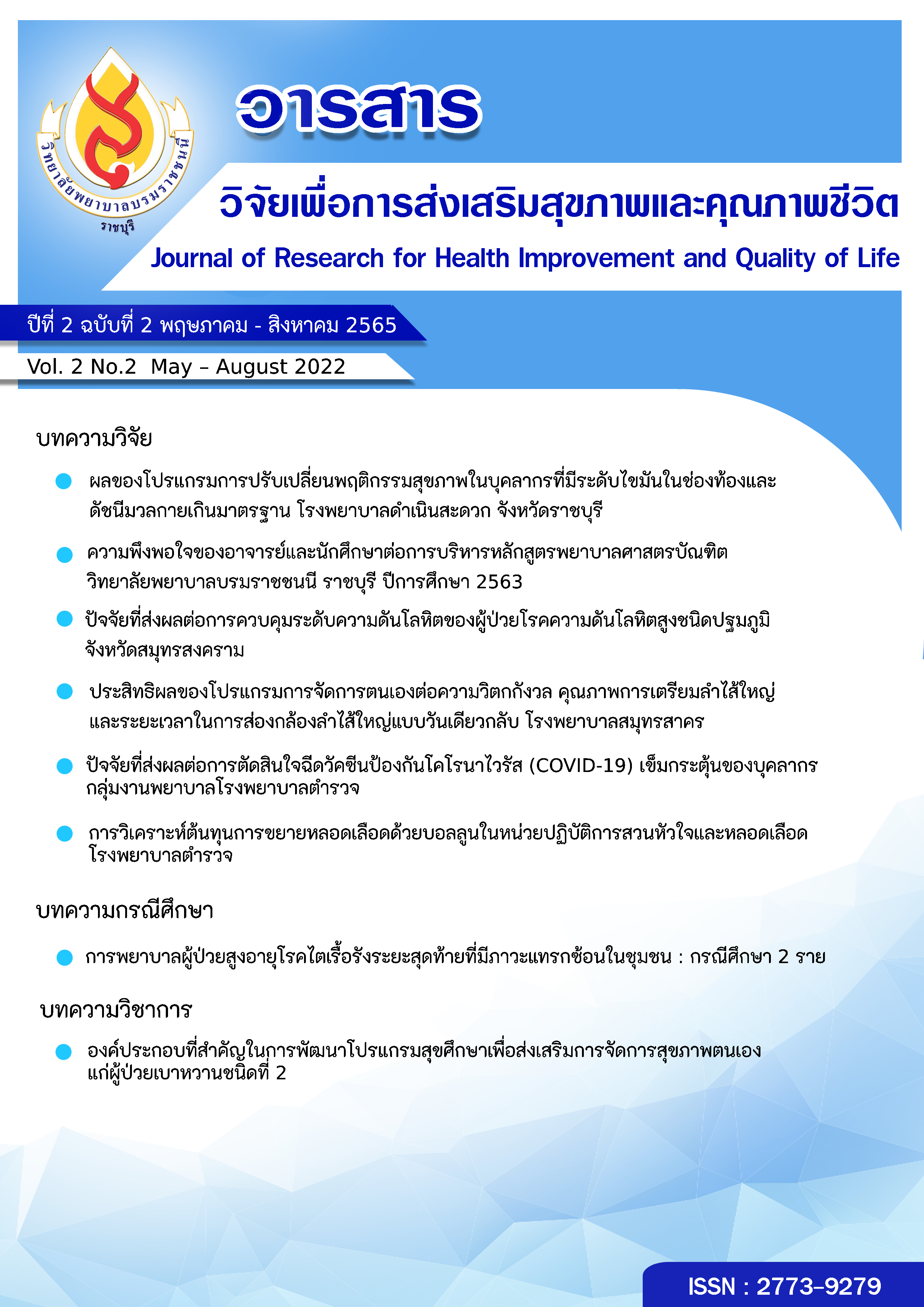องค์ประกอบที่สำคัญในการพัฒนาโปรแกรมสุขศึกษาเพื่อส่งเสริมการจัดการสุขภาพตนเองแก่ผู้ป่วยเบาหวานชนิดที่ 2
คำสำคัญ:
โปรแกรมสุขศึกษา , การจัดการสุขภาพตนเอง , เบาหวานชนิดที่ 2บทคัดย่อ
ตลอดระยะเวลาหลายสิบปีที่ผ่านมาพบว่าได้มีการพัฒนาโปรแกรมสุขศึกษาเพื่อส่งเสริมการจัดการสุขภาพตนเองแก่ผู้ป่วยเบาหวานชนิดที่ 2 อย่างต่อเนื่องมากมาย โดยในแต่ละโปรแกรมมีการมุ่งเน้นลักษณะการส่งเสริมการปรับเปลี่ยนพฤติกรรมเพื่อผลลัพธ์ทางสุขภาพที่แตกต่างกัน อย่างไรก็ตามโปรแกรมสุขศึกษาเพื่อส่งเสริมการจัดการสุขภาพตนเองแก่ผู้ป่วยเบาหวานชนิดที่ 2 ที่มีประสิทธิภาพ ควรมีองค์ประกอบหลักสำคัญ อันได้แก่ รูปแบบการสอนโดยการเข้ากลุ่มแบบเผชิญหน้า, เนื้อหาในการสอนที่มุ่งเน้นการจัดการตนเองในการรับประทานประเภทคาร์โบไฮเดรต, การออกกำลังกายที่เหมาะสมในระดับปานกลางถึงมาก, การตรวจติดตามระดับน้ำตาลในเลือดด้วยตนเอง, ระยะเวลาการสอนแต่ละครั้งไม่ควรต่ำกว่า 1 ชั่วโมงและไม่ควรมากกว่า 2 ชั่วโมง, กิจกรรมติดตามผลการปรับเปลี่ยนพฤติกรรมและการสนับสนุนทรัพยากรที่จำเป็น โดยหากสามารถกำหนดองค์ประกอบเหล่านี้ในโปรแกรมที่พัฒนาขึ้นได้อย่างเหมาะสมอาจเป็นปัจจัยช่วยให้ผู้ป่วยเบาหวานชนิดที่ 2 บรรลุเป้าหมายสำคัญคือการควบคุมระดับน้ำตาลในเลือดได้
เอกสารอ้างอิง
Chan-o-cha, P. (2019). Thailand’s commitment to global cooperation on NCDs: acting together now. The Lancet. Elsevier Ltd, 393(10166), pp. 11–13. doi: 10.1016/S0140-6736(18)32347-X.
Davies, M. J., Heller, S., Skinner, T. C., Campbell, M. J., Carey, M. E., Cradock, S., …Khunti, K. (2008). Effectiveness of the diabetes education and self management for ongoing and newly diagnosed (DESMOND) programme for people with newly diagnosed type 2 diabetes: cluster randomised controlled trial. BMJ (Clinical research ed.), 336(7642), pp. 491–5. doi: 10.1136/bmj.39474.922025.BE.
Deakin, T. (2012). X-PERT structured education programmes improve control in diabetes. Journal of Diabetes Nursing, 16(7), pp. 266–272.
Deakin, T. A., Cade, J. E., Williams, R., Greenwood, D. C. (2006). Structured patient education: The Diabetes X-PERT Programme makes a difference. Diabetic Medicine, 23(9), pp. 944–954. doi: 10.1111/j.1464-5491.2006.01906.x.
Deerochanawong, C. & Ferrario, A. (2013). Diabetes management in Thailand: a literature review of the burden, costs, and outcomes. Globalization and Health, 9(1), p. 11. doi: 10.1186/1744-8603-9-11.
Dyson, P. A., Beatty, S. and Matthews, D. R. (2010). An assessment of lifestyle video education for people newly diagnosed with type 2 diabetes. Journal of Human Nutrition and Dietetics, 23(4), pp. 353–359. doi: 10.1111/j.1365-277X.2010.01077.x.
Eakin, E. G., Winkler, E. A., Dunstan, D. W., Healy, G. N., Owen, N., Marshall, A. M., Graves, N., Reeves, M. M. (2014). Living well with diabetes: 24-month outcomes from a randomized trial of telephone-delivered weight loss and physical activity intervention to improve glycemic control. Diabetes Care, 37(8), pp. 2177–2185. doi: 10.2337/dc13-2427.
Gamiochipi, Mireya, Cruz, Miguel, Kumate, Jesús, Wacher, Niels H. (2016). Effect of an intensive metabolic control lifestyle intervention in type-2 diabetes patients. Patient Education and Counseling, 99(7), pp. 1184–1189. doi: 10.1016/j.pec.2016.01.017.
Guo, Honglei, Tian, Xiaoli, Li, Rixia, Lin, Jingna, Jin, Nana, Wu, Zhongming, Yu, Demin (2014). Reward-based, task-setting education strategy on glycemic control and self-management for low-income outpatients with type 2 diabetes. Journal of Diabetes Investigation, 5(4), pp. 410–417. doi: 10.1111/jdi.12152.
International Diabetes Federation. (2021). IDF Diabetes Atlas, 10th edition. Brussels, Belgium. Retrieved from: https://www.diabetesatlas.org
Khunti, K., Gray, L. J., Skinner, T., Carey, M. E., Realf, K., Dallosso, H., …, Davies, M. J. (2012). Effectiveness of a diabetes education and self management programme (DESMOND) for people with newly diagnosed type 2 diabetes mellitus: three year follow-up of a cluster randomised controlled trial in primary care. Bmj, 344(apr26 2), pp. e2333–e2333. doi: 10.1136/bmj.e2333.
Ockleford, Elizabeth, Shaw, Rachel L., Willars, Janet, Dixon-Woods, Mary. (2008). Education and self-management for people newly diagnosed with type 2 diabetes: A qualitative study of patients’ views. Chronic Illness, 4(1), pp. 28–37. doi: 10.1177/1742395307086673.
Pacaud, Danièle, Kelley, Helen, Downey, Angela M., Chiasson, Mike. (2012). Successful delivery of diabetes self-care education and follow-up through ehealth media. Canadian. Journal of Diabetes. Elsevier Ltd, 36(5), pp. 257–262. doi: 10.1016/j.jcjd.2012.08.006
Rawdaree, Petch, Ngarmukos, Chardpraorn, Deerochanawong, Chaicharn, Suwanwalaikorn, Sompongse, Chetthakul, Thanya, Krittiyawong, Sirinate,…, Mongkolsomlit, Sirima. (2006). Thailand Diabetes Registry (TDR) project: Clinical status and long term vascular complications in diabetic patients. Journal of the Medical Association of Thailand, 89(SUPPL. 1).
Reutrakul, S. & Deerochanawong, C. (2016). Diabetes in Thailand: Status and Policy. Current diabetes reports, p. 28. doi: 10.1007/s11892-016-0725-7.
Ryan, P. & Sawin, K. J. (2009). The Individual and Family Self-Management Theory: Background and perspectives on context process and outcomes. Nursing Outlook, Vol. 57 (pp. 217-225). Retrieved from: http://www.ncbi.nlm.nih.gov/pmc/articles/PMC2908991/
Sacco, William P., Bykowski, Cathy A., Mayhew, Laura L., White, Kristi E. (2012). Educational attainment moderates the effect of a brief diabetes self-care intervention. Diabetes Research and Clinical Practice.
Saxe-Custack, Amy; Weatherspoon, L. (2013). A Patient-Centered Approach Using Community-Based Paraprofessionals to improve self-management of Type 2 diabetes. American Journal of Health Education, 44(Jul-Aug 2013), pp. 213–220. doi: 10.1080/19325037.2013.798213.
Shakibazadeh, Elham, Bartholomew, Leona Kay, Rashidian, Arash, Larijani, Bagher. (2016). Persian Diabetes Self-Management Education (PDSME) program: Evaluation of effectiveness in Iran. Health Promotion International, 31(3), pp. 623–634. doi: 10.1093/heapro/dav006.
Skinner, T. C., Carey, M. E., Cradock, S., Daly, H., Davies, M. J., Doherty, Y., …, Oliver, L. (2006). Diabetes education and self-management for ongoing and newly diagnosed (DESMOND): Process modelling of pilot study. Patient Education and Counseling, 64(1–3), pp. 369–377. doi: 10.1016/j.pec.2006.04.007.
de Vries McClintock, H. F., Morales, K. H., Small, D. S., Bogner, H. R. (2014). A brief adherence intervention that improved glycemic control: mediation by patterns of adherence. Journal of Behavioral Medicine, 38(1), pp. 39–47. doi: 10.1007/s10865-014-9576-3.
Yang, Yi Sun, Wu, Yueh Chu, Lu, Ying Li, Kornelius, Edy, Lin, Yu Tze, Chen, Yu Ju, …, Huang, Chien Ning (2015). Adherence to self-care behavior and glycemic effects using structured education. Journal of Diabetes Investigation, 6(6), pp. 662–669. doi: 10.1111/jdi.12343.
ดาวน์โหลด
เผยแพร่แล้ว
ฉบับ
ประเภทบทความ
สัญญาอนุญาต
ลิขสิทธิ์ (c) 2022 วิทยาลัยพยาบาลบรมราชชนนี ราชบุรี

อนุญาตภายใต้เงื่อนไข Creative Commons Attribution-NonCommercial-NoDerivatives 4.0 International License.
บทความทีตีพิมพ์ในวารสารนี้ถือว่าเป็นลิขสิทธิ์ของวิทยาลัยพยาบาลบรมราชชนนี ราชบุรี และผลงานวิชาการหรือวิจัยของคณะผู้เขียน ไม่ใช่ความคิดเห็นของบรรณาธิการหรือผู้จัดทํา




